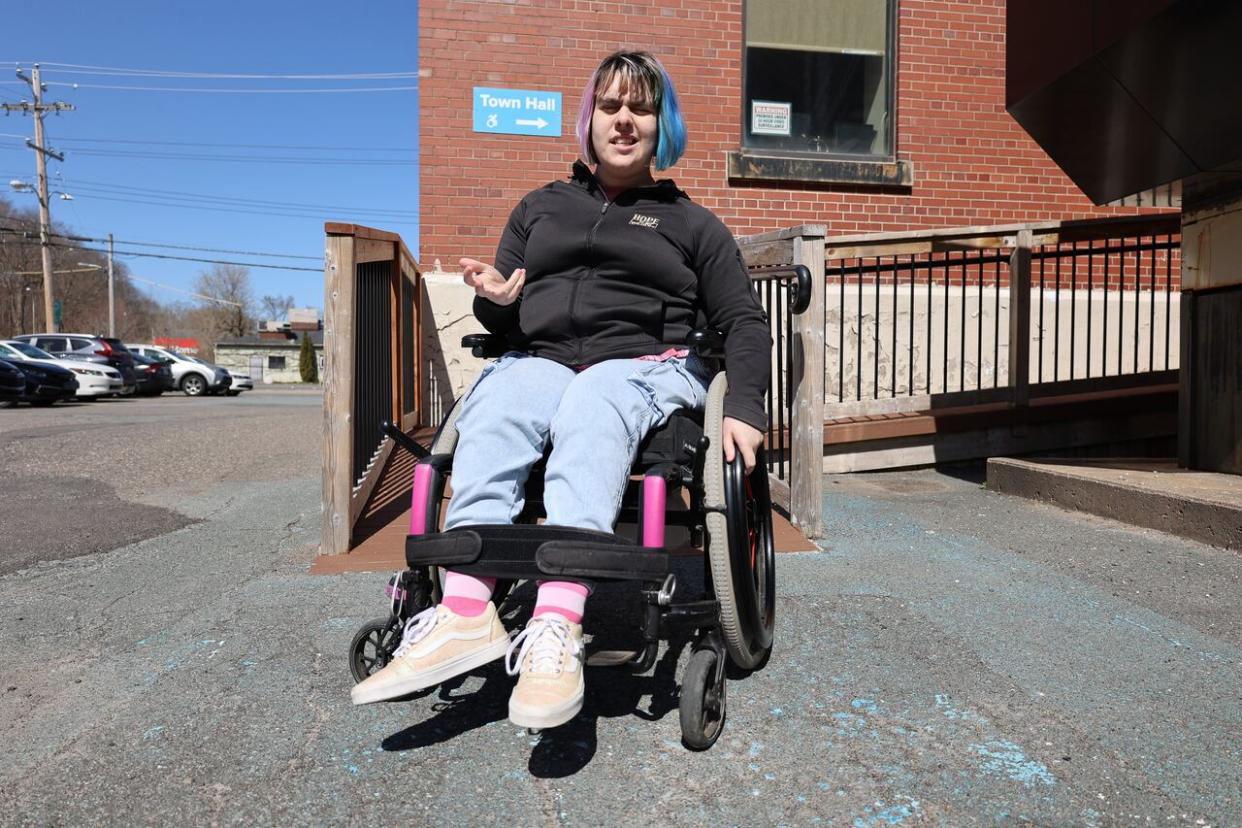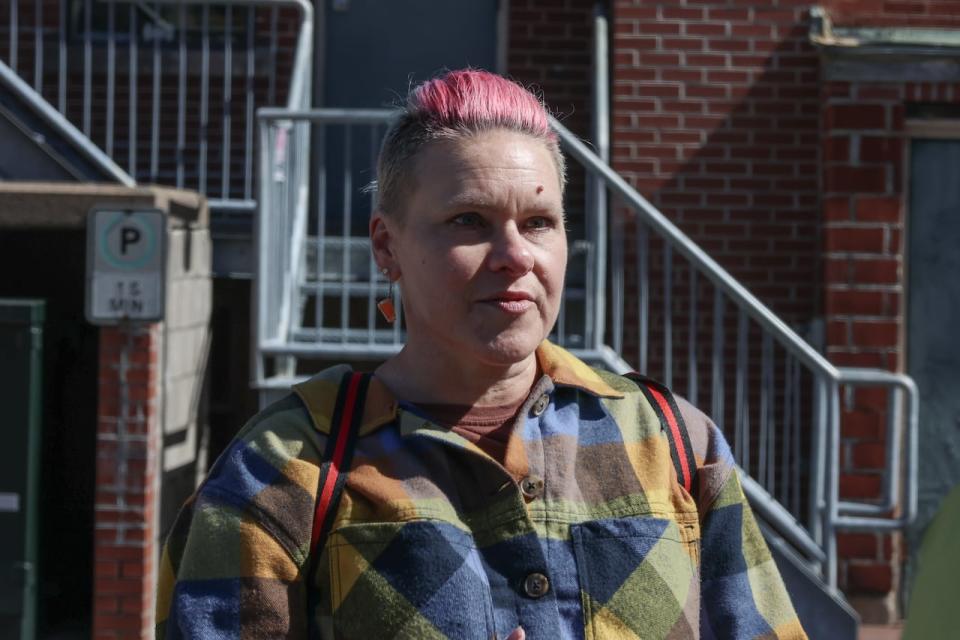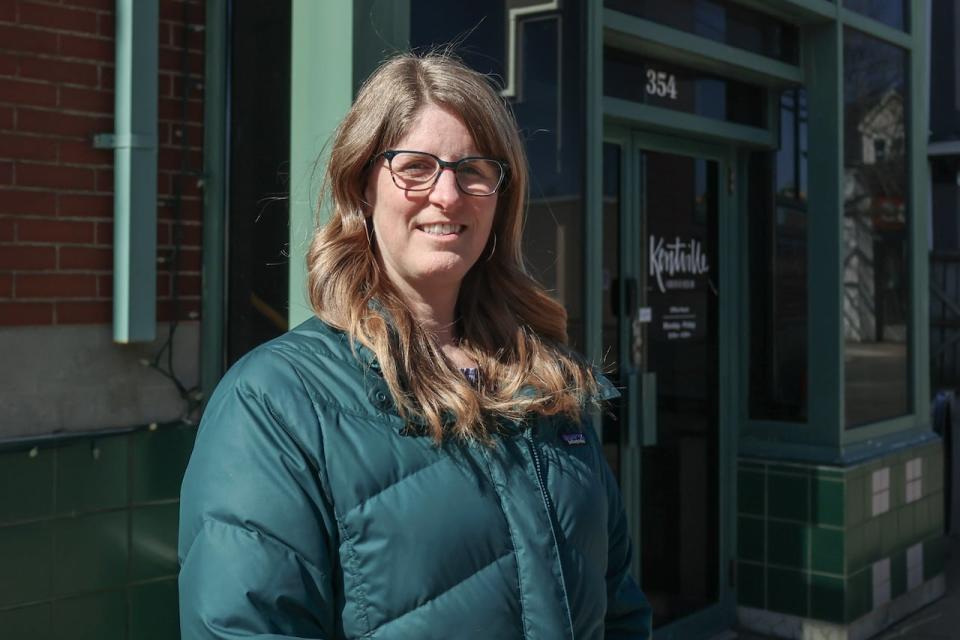How one N.S. town is working with people with disabilities toward a barrier-free community

Hannah Corkum's weekly schedule is usually quite busy. The 23-year-old Annapolis Valley woman is a sledge hockey athlete and horseback rider.
With her mother, Shelley Corkum, she runs a vintage shop called Retro Hippo Stay and Play Boutique.
But of all the places she goes, there's an important place she can't: the stone steps at the front entrance to the Kentville Town Hall.
That's because Corkum was born with cerebral palsy and uses a wheelchair, and the building's main entrance is not wheelchair accessible.
Even the rear entrance, which has an angled wooden ramp, is difficult for her to use without assistance. It's too steep and has a lip at the door.
It's "a little frustrating," Corkum said in a recent interview.
"Sometimes my wheelchair slides backwards on the ramp and it's kind of hard for it to get up."
That's not the way it's supposed to be, according to the province's Accessibility Act, which states a goal of becoming "accessible by 2030." CBC News recently learned the province of Nova Scotia acknowledges it won't be barrier-free by that date, although it will have standards and enforcement in place.
But nothing prevents other organizations from trying to hit that goal, and the Town of Kentville says it means to try for it anyway.
WATCH | Kentville wants to makes its buildings more accessible
To Shelley Corkum, an accessible province by 2030 would mean more independence for her daughter and many others.
"I'd like to say it'd be a sigh of relief because we've been waiting for a long time," she said.

Shelley Corkum hopes an accessible province in 2030 would mean greater independence for her daughter and many others. (Jerry West/CBC)
Last October, Kentville had an architect do an "accessibility audit" on town hall, comparing it to the proposed built environment standard.
The Corkums helped verify the architect's work. Hannah Corkum said she wanted to do it because of her difficulty on the ramps and in the building's bathrooms.
Shelley Corkum hoped it would make people's lives easier.

Hannah Corkum in her sled playing with the Acadia Minor Sledge hockey team. (Submitted by Shelley Corkum)
"Not only for my daughter, but others that are out there that are either in a wheelchair or a walker or have some type of disability," she said.
Kentville's town hall was created by joining three separate buildings built between 1946 and 1953.
The floor levels between the original buildings don't match, leading to a patchwork of steps inside. In addition, the audit found none of the entrances or washrooms are fully accessible and all the interior doors are undersized. Some emergency escape routes are also not accessible.

Jennifer West, the deputy clerk of the town of Kentville, poses outside the front door to Town Hall. (Jerry West/CBC)
"We knew that there were a lot of construction and built environment challenges in the building," said deputy clerk Jennifer West, the town's lead on the accessibility project.
"But the audit really pointed out a lot of small things and a lot of big things that we needed to change."
One option was to move to a new building, but in April councillors decided to explore renovation instead.
The town plans to get an architect or design firm to engage with the community and develop a costed renovation plan for the building by November 2024.
"We're the keen kids in school," West said. "We really want to do a good job."
'We're going to try'
Nova Scotia wants to have six accessibility standards in place by 2030, along with enforcement. Learning the province would not meet its barrier-free goal, though, was a disappointment to the Corkums. It comes after their family has been disappointed before.
"Too much talk and not enough walk … is what I've noticed over the number of years of us being with a child with a disability," said Shelley Corkum.

Hannah Corkum, Shelley Corkum and Hannah’s twin brother, Joel, at the retro vintage shop that Shelley and Hannah operate in Centreville. (Submitted by Shelley Corkum)
Jennifer West said whether or not the province meets its goal won't change Kentville's plans.
"I don't know that we can reach the [2030] target, but we're going to try," she said, adding accessibility is a "human right."
"It doesn't matter if the province is going to meet their goals or if they interpret it a little differently. We're still going to strive to reach that barrier-free community status by 2030," she said.
Hannah Corkum said she thinks the goal of making the province accessible by 2030 is a good one and would make things "much better" for her.
"I would have a better life," she said.
MORE TOP STORIES

